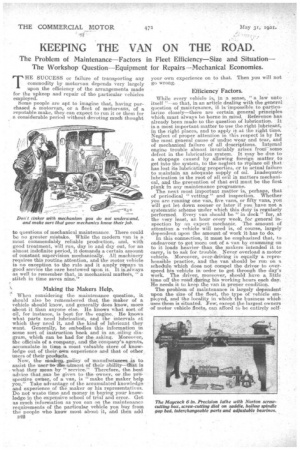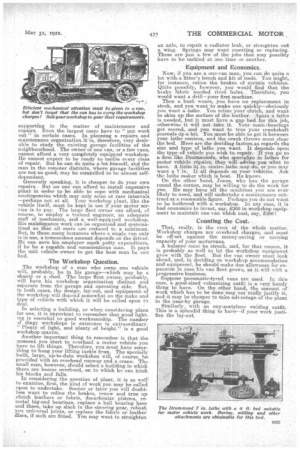KEEPING THE VAN ON THE ROAD.
Page 24

Page 25

If you've noticed an error in this article please click here to report it so we can fix it.
The Problem of Maintenance—Factors in Fleet Efficiency—Size and Situation— The Workshop Question—Equipment for Repairs—Mechanical Economies.
THE SUCCESS or failure of transporting any commodity by motorvan depends very largely upon the efficiency of the arrangements made for the upkeep and repair of the particular vehicles employed.
Some people are apt to imagine that, having purchased a motervan, or a fleet of inotorvarts, of a reputable make, they can expect to run it or them for a considerable period without devoting much thought
to questions of mechanical maintenance. There could be no greater mistake. While the modern van is a. most commendably reliable production, and, with good treatment, will run, day in and day out, for an almost indefinite period, it demands a certain amount of constant supervision mechanically. All machinery requires this routine attention, and the motor vehicle 18 BO exception to the rule and it amply repays in good service the care bestowed liven it. It ieealways as well to remember that, in mechanical matters, "a stitch in time saves nine."
Making the Makers Help,
When considering the maintenance question, it, should also be remembered that the maker of a vehicle should know, and generally does know, more about it than anyone else. He knows what sort of oil, for instance, is best for the engine. He knows what, parts need lubrication, and the intervals at which they need it, and the kind of lubricant they want. Generally, he embodies this information in Some sort of inetruction book and in an, oiling diagram which can be had for the asking. Moreover, the officials of a company,, and the 'company's agents, accumulate in time a most valuable store of knowledge out of their, awn experience and that of other lasers of their proctiete.
Now, the 11AI:de..policy of inanufsetween to assist the usereto Oleutmost of their ability -that is what they mean by " eervice," Therefore, the best advice that can be given to the owner, or the prospective owner, of a van, is "make the maker help you." Take advantage of the accumulated knowledge and experience of the maker or his representatives. Do not waste time and money in buying yoar knowledge in the expensive school of trial and error. Get as much information as you can on the maintenance requirements of the particular vehicle you buy from the people who know most about it, and then add
D22 your own experience on to that. Then you will not go wrong.
Efficiency Factors.
While every vehicle is, in a sense, " a law unto itself "—so that, iri an article dealing with the general question of maintenance, it is-impossible to particularize closely—there are certain general principles which must always be borne in mind. Reference has already been made to the question oS lubrication. It is a most important matter to use the right lubricant, in the right places, and to apply it at the right time. Neglect of proper attention in this respect is by far the most general cause of undue wear and tear, and of mechanical failure of all descriptions. Internal engine trouble almost invariably arises fronisome defect in the lubrication system. It may be due to a. stoppage caused lay allowing foreign matter to get into the system, to the neglect to replace oil that has lost its lubricating properties, or to actual failure to maintain an adequate supply of oil. Inadequate lubrication iii the root of all evil in matters mechanical, and the prevention of that evil must be the first plank in any maintenance programme. The next most important Matter is, perhaps, that of periodical "vetting "and inspection. Whether you are running one van, five vans, or fifty vans, you will get let down sooner or later if you' have not a systematic scheme under which this duty is regularly performed. Every van should be "in dock" for, at thevery least, an hour every week, for general inspection by an expert mechanic. The amount of attention a vehicle will need 'is, of course, largely dependent upon the amount of work it has to do.
In this connection,, it must be emphasized that, to endeavour to get 'more out of a van by cramming on to it loads heavier than the makers intended it. to carry, is to ask for trouble. Never overload a motor vehicle. Moreover,, over-driving is equally a reprehensible practice, and the van should be run on a sehedule -which does not compel the driver to overspeed his vehicle in order to get through the day's work. The driver, moreover, should have a little time off the roade'itiring his working hours each day. He needs it to keep the. van in proper condition.
The problem of maintenance is largely dependent upon the size of the fleet, the type of vehicle employed, and the loeality ia which the business which uses them is situated. 'ew, except he largest owners of motor vehicle fleets, can afford to be entirely self
supporting in the matter of maintenance and repairs. EVen the largest users have to "put work out " in certain eases. In planning a repairs and
maintenance organization it therefore, very desirable to study the existing garage facilities of the neighbourhood. The owner of one van, ar a few vans, cannot afford a very completely equipped workshop. He cannot expect to be ready to tackle every elites of repair. But he can do quite a lot himself, and the man in the remoter districts, where garage facilities are not so good, may be compelled to be almost selfdependent.
Generally speaking, it is cheaper to do your own repairs. But no one can afford to install expensive plant in order to be able to cope with mechanical contingencies which may only arise at rare intervals, —perhaps not at all. Your workshop plant, like the vehicle itself, must be kept in use if your motor service is to pay. The large fleet owner can afford, of course, to employ a trained engineer, an adequate staff of mechanics, and a well-equipped workshop. His maintftance work can be organized and systematized so that all costs are reduced te a Minimum. But, in those. many instances where a single van only is in use, a tremendous amount depends on the driver. He can save his employer much petty expenditure, if he be a capable and conscientious man. It pays the unit vehicle owner to get the best. man he can find.
The Workshop Question.
The workshop of a man who awns one vehicle will, probably, be in his garage—which may be a shanty or a shed. The large fleet owner probably, will have his workshop organization distinct and separate from the garage and operating side. But, in both cases, the design, lay-out, and equipment of the workshop will depend somewhat on the make and type of vehicle with which it will be called upon to deal.
In selecting a building, or when considering plans for one, it is important to remember that good lighting is essential to good workmanship.. The number sf dingy workshops in existence is extraordinary. " Plenty of light, and plenty of height" is a good workshop maxim.
Another important thing to remember is that the moment you start to overhaul a motor vehicle you have to lift things. Therefare, you must have something to hang your lifting tackle from. The specially built., large, up-to-date workshop will, of course, be provided with an overhead runway and a crane. The small man; however, should select a building in which there are beams overhead, on. to which he can hitch his ;blocks and falls.
In considering the question of plant, it. is as well.' to examine, first, the kind of work you may be called upon to undertake. Sooner or later you will doubtless want to reline the brakes, renew and true up clutch leathers or fabric, decarbonize pistons, remetal big-end bearings, replace a ball bearing here and there, take up slack in the steering gear, rebush you universal joints, or replace the fabric or leather discs, if such are fitted. You may want to straighten
an axle, to repair a radiator leak, or straighten out a wing. Springs may want resetting, or replacing. These are just a few of the jobs that may possibly have to be tackled at one time or another.
Equipment and Economics.
Now if you are a one-van man, you can do quite a let with. a fitter's bench and kit of tools. You might, for instance, reline the brakes of certain vehicles. Quite possibly, however, you would find that the brake fabric needed rivet holes. Therefore, you would want a drill—your first machine.
Then a bush wears you have no replacement in stock, and you want-io make one quickly—obviously you want a lathe. You reline your clutch, and want to skim up the surface of the leather. Again a lathe is needed, but it must have a gap bed for this job, otherwise it will not take it. Your main et bearings get scored, and you want to true yeur crankshaft journals up a bit.. You must be able to get it between your lathe centres, and the crank throws must clear the bed. Here are the deciding factors as regards the size and type of lathe you want. It depends upon the type a vehicle you with to repair. If you go. to a firm like Drunamonds, who specialize in lathes for motor vehicle repairs, they will advise you what to have. A little al in. centre lathe may do, or you may want a 7 in. It all depends on your vehicles. Ask the lathe maker which is best. He knows.
On the other hand, Jones, who has the garage round the corner, may be willing to do the work for you. He may have all the machines you are ever likely to need, -and will undertake a maintenance contract at a reasonable figure. Perhaps you do not want to be bothered with a workshop. In any case, it is bad economics to invest, say, £300 in workshop equipment to maintain one van which cost, say, £250!
CoUnting the Cost.
That, really, is the crux of the whole matter. Workshop charges are overhead charges, and must be off-set against the money-saving or earning capacity of your motorvans. A balance must be struck, and, for that reason, it is probably as well to let the workshop equipment grow with the fleet. But the van owner must look . ahead, and, in deciding on workshop accommodation and equipment, he should make due allowance for expansion in case his van fleet grows, as it will with a progressive business.
Suppose pneumatio-tyred vans are used. In this case, a good-sized vulcanizing outfit is a very handy thing to have. On the other hand, the amount of work which has to be done may not really justify it, and it may be cheaper to take advantage of the plant in the near-by garage.
Similarly, with an oxy-aoetylene -welding outfit. This is a splendid thing to have—if your work justifies the lay-out.










































